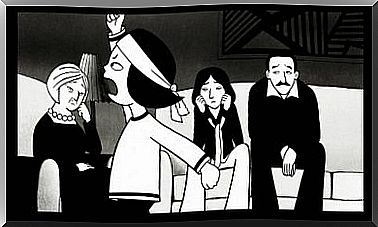Toxic Mothers

The difference between a happy person who develops his potential and a person who has doubts, is in childhood.
Research has shown that as early as pregnancy, babies perceive outside sounds in the womb, and the mother’s emotions.
At the time of pregnancy, some women, depending on the emotional environment, develop a feeling of rejection of the baby, which can be even stronger during postpartum depression. In most cases, this is a transient situation.
Why do some mothers abuse their children?
One of the explanations may be that they were themselves abused as children, where they learned that the world is, by definition, an insecure place.
Thus, the behavior of these mothers has been shaped by abuse and that is why they reproduce this behavior with their children.
Oddly enough, while being abused themselves, they told themselves they would never do it again.
So why are they doing this? What they hated the most is actually becoming automatic behavior, because that’s what they’ve learned.
A toxic mother is manipulative. She uses comparisons and public humiliation as a method of control.
When the mother gives birth to her children, she directs her preference towards one of them, according to the position in the siblings, in contempt of the others.
This is where the comparison appears. There is no weapon more destructive than the unfair comparison, emphasizing the one, and devaluing the other.
By making herself an ally in her children, the mother derives some benefit from them. She needs to form an alliance with other family members to exercise control.
Manipulation is the other face of the toxic behavior of progenitors. The mother tends to put herself in the position of victim, to generate a feeling of guilt with her son or daughter, especially when they are adults and make independent decisions.
Toxic mothers treat their children as if they were still babies, denying them the adult position.
Control can manifest itself in the choice of clothing, color, style, even the manner of speaking. And the situation tends to be even more critical when they decide to start a family.
Parents want to dictate the family of their children, how to raise grandchildren, how the daughter-in-law should cook, and even, tell when it is best to have a child.
Of course, mate choice is a bone of contention in many families, as manipulative parents tend to disapprove of the situation.
But do they act only because they learned it this way in their childhood? Behind this behavior hides the fear of abandonment or loneliness.
This is a situation that occurs long after, when children fail to establish a limit to their personal space.
In the case of only children, if the parent suffers from an illness or a disability situation, the situation is even worse.
It is a parade of: “what I did for you, I sacrificed myself for you etc”. We question the child who does not think like himself.
How to act in the face of this situation?
First of all, it must be recognized that professional help is needed. This is because if the inflicted wounds are left untreated, they have a very high percentage of spreading to one’s own children. We must therefore break the cycle of toxicity.
In addition, it is advisable, as far as possible, to put a physical distance between the manipulating parent and the son or daughter.
It must be admitted that when the child is still economically dependent on the mother, it is difficult to set limits.
However, it is important to maintain some form of independence by using other possibilities and not to think that one type of addiction forces us to undergo others.
On the other hand, it must be recognized that the economic situation in some countries does not allow it, and even some people who have a job cannot pay rent on their own.
It is very important to do psychological work when detecting manipulation. After an interval of indignation at the confrontation with reality, it is normal for the child to feel a great release from the weight of his guilt.
When you recognize the manipulation, it is possible to protect yourself and cut the cord.
That is why if this is your situation, you should seek professional help. Do not argue, because you will only increase the frustration, anger and pain. Be firm. Break the vicious circle and don’t repeat the scenario.









